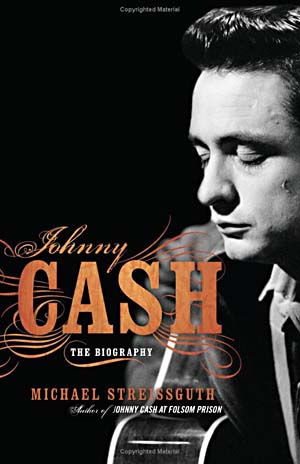
I just finished Michael Streissguth’s "Johnny Cash: The Biography" and found it a fascinating read. My interest in Johnny Cash has been building since I caught "I walk the Line" last year, followed by the documentary, "Johnny Cash at Folsom Prison: The Making of a Masterpiece." Picking up a Cash biography was the next logical step. Streissguth, the author of "Johnny Cash at Folsom: The Making of a Masterpiece" and editor of "Ring of Fire: The Johnny Cash Reader" is the perfect fellow to tell the story of the "man in black" - detailing the legend and reality.
Johnny Cash would have been 77 years old this year. He wrote not one, but two autobiographies during his lifetime. The public image incorporated the widespread belief that Cash beat his drug habit in the early 1970's and lived a drug-free life thereafter. Streissguth debunked that myth in the first few pages. While Cash did get clean, he only managed to stay free from drugs for a half dozen years - at most. By the late 1970's and until his death in 2003, Cash resumed his drug habit. When under the influence his music suffered, his relationships suffered, and he nearly died.
The second major storybook myth quickly disposed in the book was the "happily ever after" relationship between Johnny and his second wife, June Carter Cash. While they remained married for the rest of their lives, the relationship became strained - to the point June had drawn up the divorce papers. But they overcame the low points and managed to stay together. Any viewer, without the benefit of this knowledge, would leave "I walk the Line" with a sanitized, highly sterilized view of Cash and his life.
But the book just doesn’t tear down the Cash the legend. Streissguth, a serious scholar of Cash, labored - successfully - to present the real portrait of Cash. My favorite part of the book is his description of the Johnny Cash the songwriter. A truly creative writer in his own right, and in collaborating with his contemporaries - especially Bob Dylan in the late 1960's. That Nashville summit, if you will, paved the way for the emergence of country/folk. No small achievement to bring together two very different styles of music (and fan bases).
Cash reached out to Dylan, sensing their share interests: "Listening to "The Freewheelin’ Bob Dylan" album of 1963, he heard a voice that siphoned waters from the past, protested the status quo, and sounded as good as any country-music performer’s he knew. Impressed, he dashed off a letter to Dylan, who also recorded for Columbia, initiating a halting correspondence fueled by Cash’s curiosity and Dylan’s obvious respect for a man who had recorded modern electric folk since the 1950s." They remained lifelong friends.
Streissguth conducted extensive interviews (including Cash’s three daughters and his in-laws, to mention just a few individuals with first hand knowledge to share) and exhaustively researched the Cash archives to write this biography. One startling revelation is the extent to which Cash’s father truly resented his son’s success. Despite all of Cash’s efforts to win a modicum of affection (and respect) from his father during his lifetime, he was rebuffed and insulted at every possible opportunity.
"Johnny Cash: The Biography" made me want to explore the complex, multifaceted Cash and his music even more. The one small quibble I have is the narrative. Steissguth often stepped out of the linear timeline and jumped ahead in the story to connect a thread or thought to his current point. That technique does get tiresome. But it won’t prevent me from recommending the book!
Monday, August 10, 2009
michael streissguth, "johnny cash: the biography" book review
Labels:
book review,
johnny cash
Subscribe to:
Post Comments (Atom)




















No comments:
Post a Comment